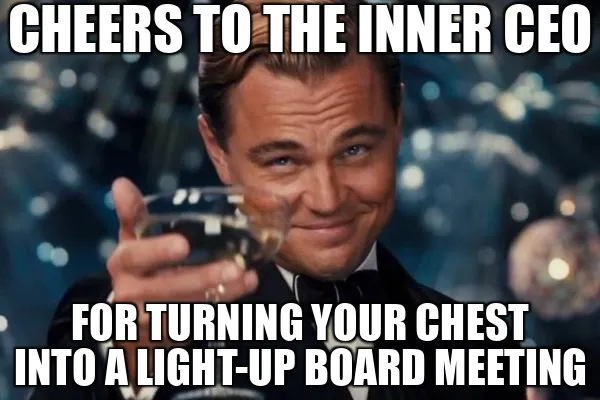If you’re the sole founder of a business, you know everything falls on your shoulders.
And if you don’t get up and do the work day after day, no one else will. Things just won’t get done, and you’ll never retire to the Bahamas (oh no!).
When you have a question that makes you paralyzed, you just have to say “fingers crossed!” and deal with the stress of uncertainty…
And trust me, that can get quite lonely. I mean, I know you know that, you clicked on an ‘entrepreneur burnout’ article after all 😀
But listen…
This article will be quite ‘emotional’, in the sense that this time, I won’t tell you how to build a product, do your marketing, or attract investors.
I’ll help you deal with entrepreneur burnout as a result of loneliness, and if that’s not ‘macho’ enough for you, well… that’s too bad.
We all have emotions and an inner world. Ignoring it leads to failure. Being aware of your emotions and thoughts not only helps you become a more fulfilled person, but it also translates into your business.
An absence of emotional outlets can turn internal struggles into dangerous loops of self-talk and stress that lead to burnout, mental health issues, or worse…
(That’s if you consider having an imaginary friend a bad thing…)
For many solo founders, marketing is a primary source of this stress. The ‘mystical black art’ of SEO feels like an ‘existential threat’ that triggers this exact burnout loop. Adopting a pragmatic SEO strategy is often the first step to reducing this anxiety.
Because there is no person who will make a decision for you… you can’t cry to anyone.

If you’re an employee, you can always delegate the decision upward. You just call your manager.
And the manager freaks out and calls his manager… who then does the same – and so on, until the final boss is reached.
Point is, if something is really pissing you off, you can usually talk about your problems to someone. You can complain as much as you want to.
You always have an emotional outlet (and that’s a good thing).
I’m not saying employees are weak or anything like that. Processing your frustrations by talking about them is psychologically good for you.
But part of being a leader is learning how to thrive without the same privilege.
When you’re a leader, you can’t cry to anyone. You don’t want to seem weak and uncertain to your employees and co-founders.
Or if you’re a solopreneur, you can’t seem weak because there is literally no one to turn to. You might feel misunderstood. You might feel that you can’t talk to anyone about what’s bothering you, because it’s just not going to be a productive conversation.
We’ve all been there… and there is an answer!
But first, let me address another question that I’m sure a lot of people reading this have:
I agree with you there.
Personally, I think that being able to show your weakness is a strength. It’s self-awareness. It’s wisdom.
And I think Western culture mostly thinks the same.
In Eastern cultures, though, it’s not accepted to show or discuss your weaknesses.
You’re expected to maintain an external image of being very confident, very strong, and very authoritative as a leader.
And that can be quite hard – because no matter what, these pains will always be there. Everyone experiences pain, everyone has weaknesses.
WOKEISM ALERT: Hot take in 3…2…1…
I’m also not telling you to CONSTANTLY complain and talk about your weaknesses and problems.
Listen, if you’re a leader, you have to lead.
You don’t want to create the image of a weak entrepreneur and leader who just goes on and on talking about their flaws.
You’ll have to control your emotions, mask them sometimes, and find ANOTHER outlet. Find your limited circle of people that you can vent to, where it’s okay.
That will allow you to lead your team as confidently as possible. Their emotional states often depend on yours.
Remember that.
For more real talks and life-changing, extremely deep and philosophical insights like these, join my email list here:
Oh… as a bonus, you’ll also get The 8D Framework To Launch Your Business. It’s a free e-book I made to help you… Yeah, launch your business. It’s amazing. Trust me. Get it.
Anyway!
If you can’t tell anyone about your troubles, then you’ll start eating yourself alive.
You’ll start talking to yourself, and that’s a damn good path toward schizophrenia and other psychological disorders, stress, and so on.
You don’t want this meme to describe you, do you?
So yeah, being a solo founder, especially in an Eastern culture, is quite hard – it’s not for everyone.
And another risk is failure due to personal circumstances.
If you face a problematic situation, like mental health issues, a depressive episode, alcoholism, medical problems, or anything similar – the business will suffer.
One founder = one point of failure.
As soon as this person drops out, there’s a high risk that all the processes just STOP and cease to function.
Life is really unpredictable, but everyone feels like bad things only happen to others.
Of course, I’m not telling you to live in fear or that solo entrepreneurship is wrong. Not at all.
I just want you to consider the possibilities, and I want to show you the…
In a co-founder situation, this point of failure is duplicated across several people.
And the co-founders can cover for each other. That is, one person can make decisions while the other is unavailable.
That’s another reason why startups with multiple co-founders are much more resilient and much more attractive to investors.
Investors have been burned in the past. They invested in one person and realized that putting ALL your money on one individual might be too risky. They see a group of co-founders, and immediately feel a sense of security.
Having co-founders is also helpful for your mental health.
You feel that you’re not alone in this open ocean.
You’re with someone.
You can always talk it through.
Yes, maybe you can’t cry on their shoulder (which also depends on your personal relationship with your co-founders)…
But overall, it’s MUCH easier to admit your weaknesses to someone who is on equal footing with you.
It’s definitely easier and more productive than talking to employees who are technically “beneath” you on the corporate ladder.
And any co-founder will want to support you if they’re a reasonable person.
Your co-founder, your partner in the project, should be the person who supports you in hard times (and inventors know that!)
As for the number of people – there are LOTS of different opinions on the Internet.
Ideally, I would consider a partnership with two or three people, no more.
When there are too many people, it turns into a collegial decision-making system… and responsibility just gets diluted.
There are too many opinions, too many contradictions and confusions, and the system just moves too slowly.
It starts to turn into chaos a little bit, if you ask me.
It’s also kind of like a board of directors, a bureaucratic machine where you have to use documents and procedures to assign responsibility.
And documents are scary, we all know that…
When there are two or three people, you can think more clearly and easily state who’s responsible for what.
This sounds amazing, but still, founders often lament the difficulty of finding a co-founder.
I mean, it’s not easy, especially in the early stages.
You need a minimum viable product (MVP) to attract a co-founder… but you need a co-founder to build an MVP.
Gotta love those loops.
Pro-tip to break them:
Ah, I know I said I would focus on the emotional side of things. I just can’t help myself.

Another great way to overcome founder loneliness is to join a funny cult find an entrepreneur club.
There’s probably one in your city. Come on, don’t be shy. Don’t immediately discard this idea.
I currently live in Israel, and I’m a member of one of the entrepreneur clubs in the country. It’s a club for small and medium-sized business owners.
I decided to join because it’s a great way to NOT stay in a vacuum.
It’s a good way to talk to others, get out, see what’s happening, get some advice, give out some advice…
And it’s also a good way to find clients and partners 😏️.
I’ve found several of my consulting clients in that club – and right now, I’m working with them.
So if the thought of meeting like-minded people isn’t appealing enough, think of the clients you could land.
It works, you just have to allow yourself to be social.
Another way to overcome this ‘stuck’ feeling is through taking consultations.
Different people can consult you on certain processes – product management, business strategy, taxes, finances…
You can always at least get advice.
A consultant, as a rule, won’t take the responsibility of making the decisions for you, so the very prerogative and burden of decision-making still remains with you.
A good consultant won’t make decisions for you — but they WILL help you see the road ahead more clearly
Woah, what a good headline, I wonder who put THAT there…
Look, I’ve been that solo entrepreneur. I’ve made hard calls, fired people I cared about, and stayed up all night second-guessing everything.
I couldn’t have written this article without knowing exactly how you feel.
Nowadays, I offer a wide range of consulting services, from product marketing to investor support, to AI automation to streamline operations.
In this article, I wanted to teach you how to avoid entrepreneur burnout as a result of founder loneliness.
In short, don’t ignore the need to connect with like-minded people. When you’re at the top of the ‘corporate ladder’, you have NO one to delegate decisions to.
It can get quite lonely and stressful, so make sure to find an emotional outlet to avoid medical and mental problems. Those are real.
Here’s a summary of how to do that:

Email subscription is available ONLY TODAY (oh, okay, and tomorrow).
Surely, we respect your inbox! Unsubscription works every day.

We’d love to tailor your experience — which of these best describes you?